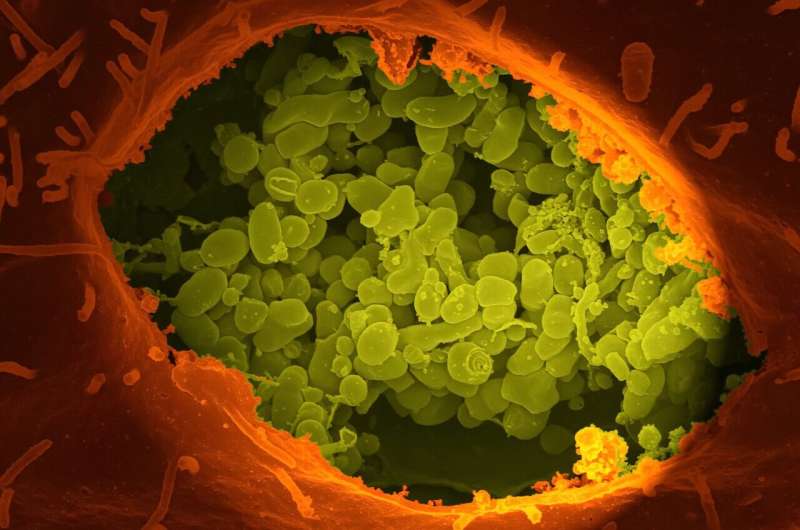This article has been reviewed according to Science X's editorial process and policies. Editors have highlighted the following attributes while ensuring the content's credibility:
fact-checked
trusted source
proofread
Having more diverse gut bacteria can protect against diarrheal disease, study finds

The severity of a diarrheal disease could be down to the bacteria in your gut, according to new research from the University of East Anglia.
Cryptosporidiosis is responsible for over 100,000 deaths annually, predominantly in children under five. It also affects animals, and a new study published today in Virulence shows that large animals—including primates—with less different kinds of bacteria in their gut are the more severely affected.
The study reveals that introducing more diverse gut bacteria can improve outcomes, including reducing diarrhea and potential for the disease to spread.
The research team, led by Prof. Kevin Tyler at UEA's Norwich Medical School, say that diet, probiotics and fecal transplant therapy could help target the disease by improving gut bacteria in people and animals.
Prof. Tyler said, "The vast majority of infections and deaths happen in low-income countries, but outbreaks also occur in the UK and elsewhere in Europe. In the UK, the disease is currently re-emerging and cases this year are increasing dramatically, suggesting the disease is currently epidemic. There are no human vaccines and only one drug licensed for human use, which is not effective for many who are affected.
"So, understanding what that can improve outcomes is critical to tackling outbreaks. We wanted to know whether some of the variation in symptoms might relate to the make-up of an infected person or animal's gut bacteria and whether that composition was in turn affected by having cryptosporidiosis."
The team collected all studies that had looked at the composition of gut bacteria in mammals which were infected by cryptosporidium and for which the data had been made publicly available. They compared these to answer questions about the significance of gut bacterial diversity and the effect of cryptosporidium infection.
Lead researcher Georgina Hurle, also from UEA's Norwich Medical School, said, "The Cryptosporidium parasite is one of several microorganisms that cause diarrheal disease. It affects both babies and new-born livestock and it can be contracted either from animals or from people. Most people contracting cryptosporidiosis will recover naturally, but some people and animals will require treatment, suffer long term consequences from the infection, and may even die.
"The severity of the disease is known to be affected by prior exposure, so adults are generally less severely infected and recover better. We found that more severely affected large animals such as cows, sheep and primates, have less different kinds of bacteria in their gut. We also found that having and even introducing more diverse gut bacteria can improve outcomes, reducing diarrhea and potential for disease transmission.
"Gut bacteria composition can be affected by diet, by consumption of probiotics and prebiotics and by therapies like fecal transplant therapy. Understanding the changes that accompany infections and outcomes provides an opportunity for such relatively affordable but novel therapies in targeting a disease for which very few interventions are currently available. This study is important in showing that these approaches may be effective at reducing disease severity in those affected and at-risk groups and populations."
More information: Microbiome diversity is a modifiable virulence factor for Cryptosporidiosis, Virulence (2023).



















